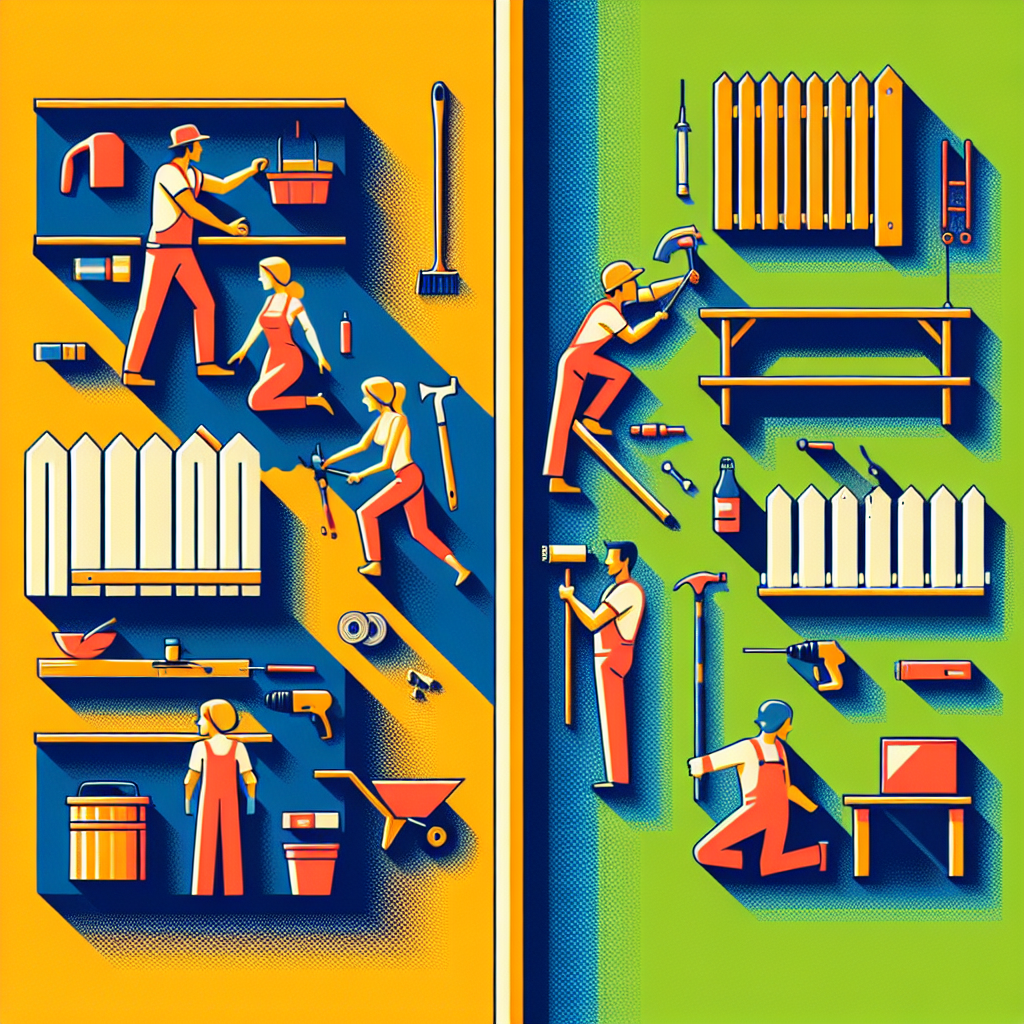The DIY Dilemma: When to Take on Home Repairs Yourself
In today’s world of endless YouTube tutorials and home improvement blogs, it’s tempting to tackle every household repair on your own. The allure of saving money and the satisfaction of a job well done can be powerful motivators. However, not every project is suitable for the average homeowner. This comprehensive guide will help you navigate the complex decision of whether to DIY or call in a professional for your home repairs.
Assessing Your Skills and Knowledge
Before diving into any DIY project, it’s crucial to honestly evaluate your abilities. Consider the following:
- Experience: Have you successfully completed similar projects in the past?
- Tools: Do you have the necessary tools and equipment, or would you need to invest in them?
- Time: Can you dedicate enough time to complete the project properly?
- Physical ability: Are you physically capable of handling the demands of the task?
- Safety concerns: Are there any potential risks or hazards involved?
The Pros of DIY Home Repairs
Cost savings: One of the most significant advantages of DIY repairs is the potential to save money on labor costs. By doing the work yourself, you’re only paying for materials.
Flexibility: You can work on your own schedule and take as much time as you need to complete the project.
Learning experience: DIY projects provide opportunities to learn new skills and gain a deeper understanding of how your home functions.
Sense of accomplishment: Successfully completing a repair can boost your confidence and give you a sense of pride in your home.
The Cons of DIY Home Repairs
Time-consuming: DIY projects often take longer than expected, especially for beginners.
Potential for mistakes: Errors can be costly and may require professional intervention to fix.
Safety risks: Some repairs involve hazards that may put you at risk of injury.
Voided warranties: DIY repairs might void manufacturer warranties or homeowners insurance policies.
When to Consider DIY Home Repairs
Simple Cosmetic Updates
Many cosmetic improvements are well-suited for DIY enthusiasts:
- Painting walls or furniture
- Installing new light fixtures
- Replacing cabinet hardware
- Hanging shelves or artwork
- Refinishing hardwood floors
Basic Plumbing Tasks
Some plumbing jobs can be handled by homeowners with a bit of research:
- Unclogging drains
- Replacing faucets or showerheads
- Installing a new toilet
- Fixing a leaky faucet
Minor Electrical Work
While many electrical tasks should be left to professionals, some simple jobs can be DIY:
- Replacing light switches or outlets
- Installing ceiling fans
- Updating light fixtures
Safety tip: Always turn off the power at the circuit breaker before attempting any electrical work.
Landscaping and Outdoor Projects
Outdoor improvements are often great DIY opportunities:
- Planting trees, shrubs, or flowers
- Building a raised garden bed
- Installing a sprinkler system
- Constructing a simple deck or patio
When to Call a Professional
Complex Electrical Work
Electrical work can be dangerous and should often be left to licensed electricians:
- Rewiring a room or entire house
- Installing new circuits or upgrading the electrical panel
- Troubleshooting persistent electrical issues
Major Plumbing Repairs
Some plumbing jobs require specialized knowledge and tools:
- Repiping your home
- Installing or repairing sewer lines
- Dealing with major leaks or flooding
Structural Changes
Any project that affects the structural integrity of your home should be handled by professionals:
- Removing or adding walls
- Repairing foundation issues
- Major roof repairs or replacements
HVAC System Repairs
Heating, ventilation, and air conditioning systems are complex and often require professional expertise:
- Installing a new HVAC system
- Repairing or replacing furnaces or air conditioners
- Dealing with refrigerant leaks
Tools and Resources for DIY Success
Essential Tools for Every Homeowner
Investing in a basic tool kit can prepare you for many DIY projects:
- Screwdrivers (flathead and Phillips)
- Hammer
- Pliers
- Adjustable wrench
- Utility knife
- Measuring tape
- Level
- Power drill
Online Resources and Tutorials
Take advantage of the wealth of information available online:
- YouTube: Countless video tutorials for various home repairs
- Home improvement blogs: Detailed guides and tips from experienced DIYers
- Manufacturer websites: Specific instructions for products and appliances
- Online forums: Communities where you can ask questions and get advice
Local Workshops and Classes
Many hardware stores and community centers offer workshops on various home improvement topics. These can be excellent opportunities to learn new skills and get hands-on experience.
The Importance of Proper Planning
Research and Preparation
Before starting any DIY project, thorough research is crucial:
- Read multiple tutorials or guides on the specific repair
- Watch video demonstrations
- Understand the tools and materials required
- Familiarize yourself with potential challenges or complications
Creating a Project Plan
Develop a detailed plan for your DIY repair:
- Break the project into manageable steps
- Estimate the time required for each step
- Create a list of necessary materials and tools
- Set a realistic timeline for completion
Safety Considerations
Always prioritize safety when taking on DIY repairs:
- Wear appropriate protective gear (safety glasses, gloves, etc.)
- Follow proper safety procedures for tools and materials
- Have a first aid kit readily available
- Know when to stop and seek professional help if you encounter unexpected issues
The Cost Factor: DIY vs. Professional Services
Calculating DIY Costs
When considering a DIY repair, factor in all potential costs:
- Materials and supplies
- Tools (purchase or rental)
- Permits (if required)
- Potential costs of mistakes or redoing work
Estimating Professional Service Costs
To compare with DIY, research the cost of professional services:
- Get multiple quotes from reputable contractors
- Ask about warranties or guarantees on work
- Consider the value of your time and the quality of professional work
The Environmental Impact of DIY vs. Professional Repairs
Eco-Friendly DIY Practices
When tackling DIY projects, consider the environmental impact:
- Use eco-friendly materials and products
- Properly dispose of or recycle waste materials
- Upcycle or repurpose items when possible
Professional Services and Sustainability
Many professional contractors now offer eco-friendly options:
- Energy-efficient upgrades
- Sustainable materials and practices
- Proper disposal and recycling of waste
The Role of Technology in Home Repairs
Smart Home Diagnostics
Advancements in smart home technology can aid in diagnosing issues:
- Smart thermostats for HVAC problems
- Water leak detectors for plumbing issues
- Energy monitoring systems for electrical concerns
Augmented Reality (AR) for DIY Projects
AR apps are becoming increasingly useful for home repairs:
- Visualizing paint colors or furniture placement
- Step-by-step AR-guided repairs
- Measuring spaces accurately using your smartphone
Legal Considerations for DIY Home Repairs
Permits and Regulations
Some home repairs may require permits or adherence to local building codes:
- Check with your local building department before starting major projects
- Understand the consequences of non-compliance with regulations
- Consider hiring a professional for projects requiring permits
Insurance Implications
DIY repairs can impact your home insurance:
- Some policies may not cover damage resulting from DIY work
- Major renovations might require updates to your insurance policy
- Professional work often comes with warranties that can protect you
The Future of DIY and Professional Home Repairs
Emerging Trends in DIY
The DIY landscape is constantly evolving:
- 3D printing for custom parts and repairs
- Virtual reality training for complex DIY tasks
- Increased focus on sustainable and eco-friendly DIY solutions
Changes in Professional Services
The professional repair industry is also adapting:
- Remote diagnostics and consultations
- Increased specialization in energy-efficient and smart home technologies
- Adoption of advanced tools and techniques for faster, more efficient repairs
Conclusion
Deciding whether to DIY or call a professional for home repairs is a nuanced decision that depends on various factors. While DIY projects can save money and provide a sense of accomplishment, they also come with risks and potential pitfalls. On the other hand, professional services offer expertise and peace of mind but at a higher cost.
The key is to honestly assess your skills, the complexity of the project, and the potential risks involved. For simple cosmetic updates and basic repairs, DIY can be an excellent option. However, for complex, dangerous, or legally regulated projects, it’s often best to rely on professional expertise.
Remember that the goal is not just to complete the repair, but to do so safely, effectively, and in compliance with relevant regulations. By carefully considering all aspects of the project and your own capabilities, you can make an informed decision that ensures the best outcome for your home and your peace of mind.
FAQs
1. How do I know if a repair is too complex for DIY?
If the repair involves major systems (electrical, plumbing, HVAC), structural changes, or requires specialized tools or knowledge, it’s likely too complex for most DIYers. Also, if the potential consequences of a mistake are severe (e.g., flooding, fire hazards), it’s best to call a professional.
2. Can DIY repairs void my home warranty or insurance?
Yes, some DIY repairs can potentially void warranties or insurance policies, especially if they’re not done correctly or if they involve major home systems. Always check your warranty and insurance documents before attempting significant repairs.
3. What are some signs that I should stop a DIY project and call a professional?
If you encounter unexpected complications, feel unsafe, or realize the project is beyond your skill level, it’s time to call a professional. Also, if you’ve made multiple attempts to fix an issue without success, a pro can likely diagnose and solve the problem more efficiently.
4. How can I improve my DIY skills safely?
Start with small, low-risk projects and gradually work your way up. Take advantage of online tutorials, attend workshops at local hardware stores, and always prioritize safety. Practice proper tool use and wear appropriate protective gear.
5. Are there any home repairs that should never be DIY?
Generally, repairs involving gas lines, major electrical work, structural changes to the home, and asbestos or lead removal should always be left to professionals due to the significant safety risks and specialized knowledge required.

